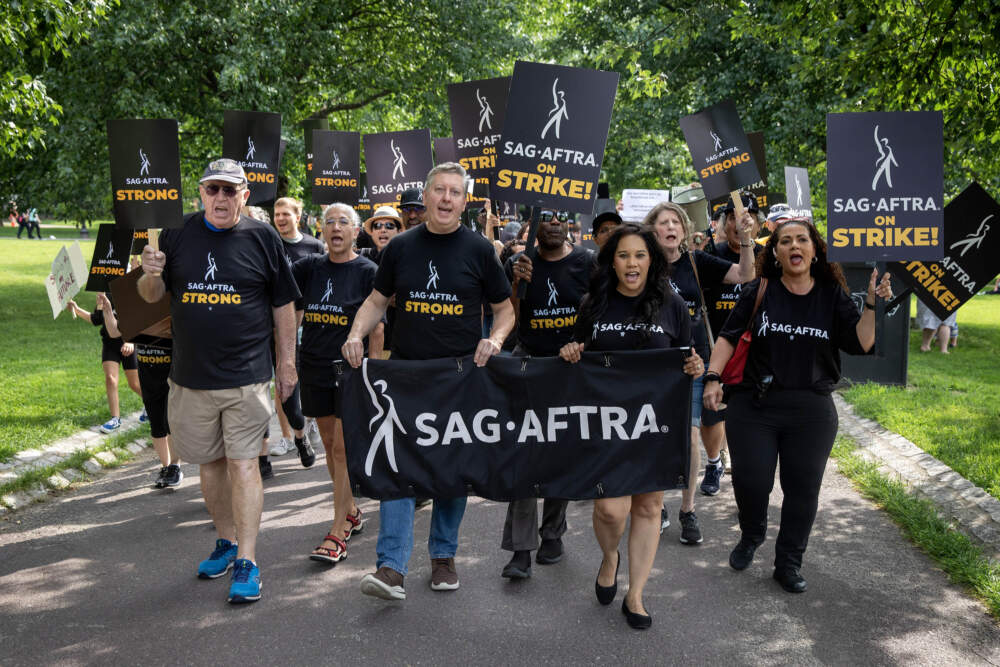Advertisement
Hollywood strikes hit home in Massachusetts
Resume
Hollywood is on strike. For the first time in six decades, people both in front of and behind the camera — the Writers' Guild of America (WGA) and the Screen Actors Guild-American Federation of Television and Radio Artists (SAG-AFTRA) — are demanding change together. They want better pay, regulations on the use of artificial intelligence (AI) in TV and film and a variety of other items.
The strike means many productions — including those in Massachusetts — have come to a halt. In 2022, more than 30 major productions were filmed in the state. Since the introduction of the Film & Television Incentive in 2006, the film industry has brought $3.2 billion to Massachusetts.
The Common set out to find out what the writers' and actors' strikes mean for the industry. We sat down with Nerissa Williams Scott, a faculty member at Emerson College and CEO and lead creative producer at the production company That Child Got Talent Entertainment, to talk about the future of film production.
Highlights from this interview have been lightly edited for clarity.
Interview Highlights
On the key issues of the two strikes:
"The main issues are the pay and being paid for the the worth of the work. I would also say the other issue is the artificial intelligence, AI, issue of people utilizing this technology to circumvent and overstep the artistry of actors and writers."
On the issues around pay:
"The main issue regarding pay stems from the fact that actors are not able to receive residuals based on content being streamed in platforms like Netflix, Hulu, Amazon, and things of that nature. Residuals are the monies that are acquired after a performance has already happened. [The concept] stems from live theater — when you would go and see a live show, you paid for a ticket, you saw it once and that was the end of it. If you wanted to see it again, you had to go back to the theater, buy another ticket, go sit down and watch the show. As TV became a thing, the same concept: if you watched a show, you watched it once, it went off the air, and that was the end of it. They came up with reruns. Reruns are an asset to not only the company that's putting the rerun out, but to the actor, the writer, and the people who are associated with that production. Why? Because you are watching it. Again, that means the people who did the work to give you that content should get paid, again. That's been what residuals have been for the longest of times.
"Now that we have streaming services, the streaming services are saying, they don't have a way to quantify how many people are watching that content. And what WGA and SAG-AFTRA are saying is: 'Yes, you do. And we would like our check based on the fact that we know, and you know, that there are more people watching this content than you're letting us know.' So where are our residuals?"
On the strikers' concerns about AI:
"The WGA is very against the AI component to [their work.] Companies are now able to have artificial intelligence create scripts. They even have the ability in AI to take [my] voice ... repurpose what I'm saying based on my voice, change my complete dialogue, and make me say something else like the words to a script, or create an entire movie that I never gave permission to do.
"Now [they are] just are completely circumventing an entire populace of people. Creativity comes from people. Humanity comes from people and that's what this art form is about. Yes, you can put in key phrases and keywords and get a computer to dump you out a script, but where is the humanity in that? The writers bring that to the table."
On how the writers' and actors' strikes will affect other professionals in the industry:
"Some of the corners of the industry that are the most affected ... are the IATSE, the crew, the Teamsters. They, too, are a union. But when you don't have writers, and now you don't have actors, what is the crew supposed to do? They can't go film themselves. ... So you have people who are probably going to be looking for other avenues to make sure that they can have a steady paycheck.
"You may have a gaffer who walks away from filmmaking to go work in commercial. What does that do for the person who's been working in commercials? It actually pushes that person out of a job, because if you have someone who has filmmaking experience — which is a lot more rigorous than commercial — you're going to go with the person who has more experience in the filmmaking industry. It's a trickle down effect."
On the hardships of a strike:
"There will be some people, companies and nonprofit organizations that are not going to be able to hang on if the strike continues for too long. But we're artists, and, let me tell you, one thing we definitely know how to do is be flexible, and take care of ourselves. So whether or not we're in the filmmaking, and TV-making industry, we're going to find a way to make sure we could put food on the table."
On what the Massachusetts economy could gain from the unions getting what they're asking for:
"The local economy in Massachusetts would be able to gain more productions. Before all of this started happening, we were slated to have between 35 and 50 films coming through the state of Massachusetts alone, if not New England, over the course of a year or two. That is an exorbitant amount of work.
"And we want this work. We got the tax credit here, we're able to make it happen. Once the union is able to sign their agreements, we will be burgeoning here. I have folks calling me from all points of the world — New Zealand, Nigeria, Sydney, Australia — asking me how to come to Massachusetts and film.
"They love our landscapes, they love our locations, they love our history, and they want to come here to capture it. ... It would be a huge benefit for our creative space to be able to have the WGA and SAG-AFTRA get their terms, so that we can all get back to work."
Editor’s note: Many WBUR employees are SAG-AFTRA members, but they are covered by a different contract than film and television actors.

